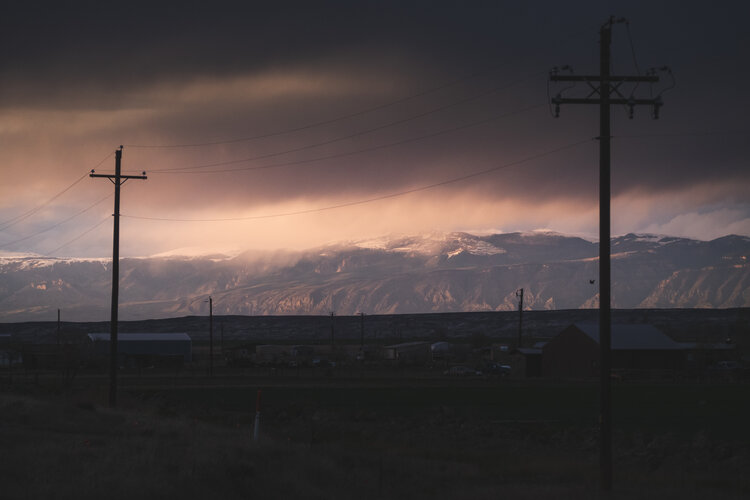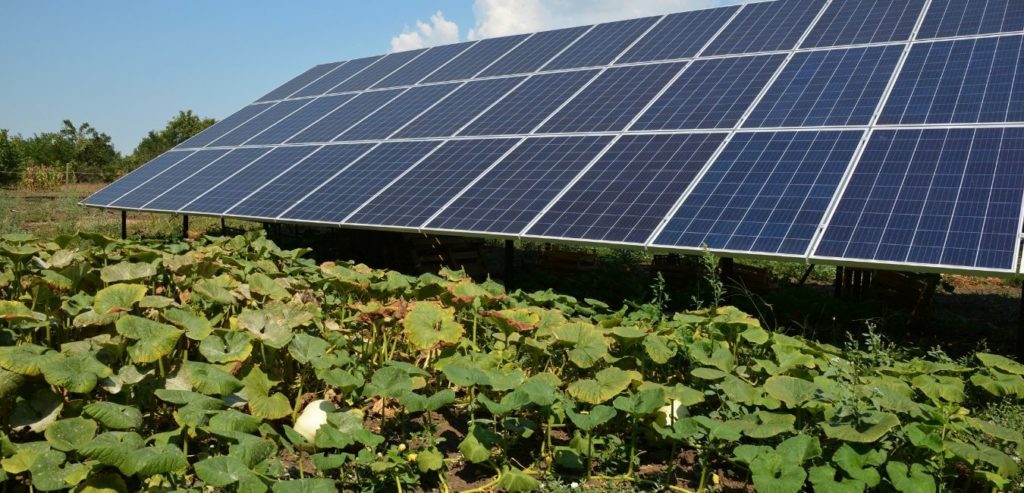What Does Living “Off-Grid” Really Mean
Living off-grid simply means that your home is not connected to the local power utility grid. Instead, you can have a self-contained solar energy system right on your property that produces enough energy to power everything that you need.
Off-grid solar power systems for homes use batteries to store the energy so that you can have power continuously, not just when the sun is shining on your solar panels.
When Does An Off-Grid Solar System Make Sense?
An off-grid solar energy system makes sense in several scenarios.
1) Too Expensive To Install Power Lines
If you live in a rural or remote location where there are no existing power lines nearby, it can be incredibly expensive to put up new lines to connect you to the grid — between $15,000 and $50,000 per mile.
If that’s the case for your home or cabin, it can be much simpler and vastly cheaper to install an off-grid solar energy system. Especially if you have a cabin that you use only occasionally for hunting or vacationing, an off-grid system makes much more sense than paying tons of money to run lines to the power grid.

2) Hedging Your Bets
Some homeowners will install an off-grid solar system on their detached buildings despite having easy access to utility power lines. This gives some part of your property continuous electric for you and your family (or business) to keep essentials running.
3) Living A Very Eco-Conscious Lifestyle
Another reason to switch to an off-grid solar system it lives a life highly eco-conscious lifestyle. Going 100% off-grid is not just an investment, but also a lifestyle change.
The average household electricity consumption kWh per day is 28.9 kWh on a typical day. This will require at least 10 kW worth of solar panels or about 33 panels which is no small system.
Do I Need A Solar Permit To Go Off-Grid?
That depends on where you are located. States, counties, and even cities have varying rules about off-grid solar energy systems and whether or not you will need a solar permit.
In most cases, you do not need a permit to install an off grid solar power systems for homes. However, we recommend you contact your local Authority Having Jurisdiction (AHJ) to find out if a permit is required for your area.
Urban vs Rural Areas
Urban areas are typically much more regulated than rural areas, so if you live in a city, you are more likely to have to obtain a permit, while in rural settings, you are less likely to need one. Worst case scenario you’ll be required to submit for a permit.
What If I Need A Solar Permit?
In this case, you may either apply yourself or hire solar plan set provider. At Sunbridge, the permit comes included with the cost of solar when you install solar with us. Find out how much off-grid solar power systems will cost you with a free solar quote.
3 Steps To Switch To Off-Grid Solar
Step 1
The first step for installing an off-grid solar energy system is to research the exact components that you will need. Obviously, you will need solar panels, a mounting system, an inverter (unless everything you want to power is 12-volt), and wiring to hook it all up and ground the system.
You’ll also need fuses and outlets that you can wire in unless your inverter has enough outlets for your needs. If you want to have power at all times (not just when the sun is shining on your panels), you will need to install a solar battery bank with a charge controller.
Regardless of how you set up your system, you’ll need to be sure that you have balanced the system properly.
Step 2
Step two is to assess your electricity consumption and needs, so you can properly size your system. You will need to calculate how your energy needs fluctuate daily, seasonally, and annually.
For instance, in the summer you may need to power an air conditioner which requires a lot of energy, but you’ll also be producing a lot of energy during that time. In the winter, you may need a heater which also takes a lot of power. At the same time, your solar energy system will be producing less energy, so you will need a sufficiently sized solar array and battery storage to handle your needs.
You can roughly determine your energy usage by checking the wattage of each appliance that you use and multiplying that by the number of hours the appliance runs each day and averaging to account for seasonal changes in energy usage. This can be all done by using one of the various solar calculators online. You may also ask us for assistance.
Step 3
Step three is to check with your local AHJ to determine whether you need a permit before you go ahead and install your system. Once you have any necessary permits and have met all regulations, you can begin the installation.
What Is The Best Equipment To Use?
When designing a system you will find there are tons of different solar panel and battery options available, ranging dramatically in price and quality.
Best Solar Panels
Sunpower solar panels makes some very high quality and efficient panels that are excellent for off-grid use because they collect the most power per square inch. This is a great advantage to have
Best Off-Grid Solar Battery
You can choose between lead-acid, lithium-ion, saltwater, and sealed AGM batteries for use with a solar energy system. Each type of battery has its own advantages and disadvantages. For rugged off-grid use, we recommend a deep cycle battery such as lead-acid batteries.
Solar Generators
With off-grid systems, generator integration is an available option, and several battery manufacturers are moving towards generator integration with battery technology.
How Huch Does An Off-Grid Solar System Cost?
The cost of installing an off-grid solar energy system varies based on how much energy you need, which dictates the size of the system. For instance, a small system that just powers essential items like lights and an energy-efficient refrigerator can cost under $40,000 all-in for the panels, batteries, and other equipment. If you want to power a house with multiple appliances, your energy system will need to be quite large and can run-up in the neighborhood of $75,000.
Costs also vary based on the equipment you select. For instance, certain types of batteries are much less expensive than others, but they may have a shorter lifespan and therefore need to be replaced more often. The same goes for solar panels, inverters, etc.
Ready to Go Off-Grid?
Contact us at Sunbridge Solar today! Our team of experts is happy to answer any questions you might have and help you get started.


